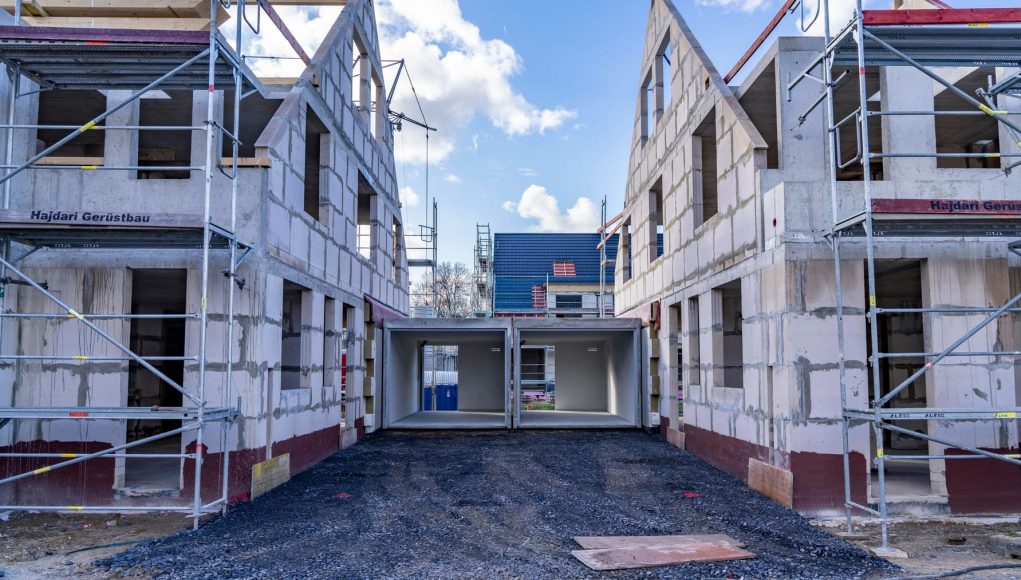With the home office trend, many offices are empty, but at the same time apartments are urgently needed. Experts see a lot of potential for rezoning – but also problems.
There is an acute housing shortage in many German cities. At the same time, more and more offices are empty, also because more and more people are working from home. A new study now shows that converting empty offices could noticeably alleviate the housing shortage in major cities. Unused office space offers the potential for around 11,300 apartments in the seven largest cities in Germany. This is the result of calculations by the real estate specialist Jones Lang LaSalle (JLL), which are available to the dpa.
“Around a fifth of the current housing demand in the seven metropolises could be covered by converting offices,” says Helge Scheunemann, research expert at JLL Germany. In some cities, a particularly high proportion of demand can be met, such as Düsseldorf (57 percent), Stuttgart (51) and Frankfurt (34). There is a lot of office space there that is suitable for conversion, unlike in Berlin, for example.
Frankfurt shows the potential
The Federal Chamber of Architects is also pushing for better use of the opportunities offered by conversions. However, not all office locations are suitable as residential areas and the architectural hurdles are comparatively high. So far, conversions to apartments have played a comparatively small role, according to JLL.
An exception is Frankfurt: The number of office conversions there has more than doubled in the past 15 years. In Frankfurt, 1,200 residential units from office conversions are also planned over the next four years, says Scheunemann. “There are many spaces in old office towers here that are suitable for conversion into apartments because their square floor plans allow for natural light.” But there is also untapped potential elsewhere. “The issue has gained momentum.”
Estimates: 600,000 apartments are missing
With the trend towards home offices, a lot of office space is empty and companies are getting rid of space. According to JLL, office vacancies in the seven metropolises of Berlin, Hamburg, Munich, Cologne, Frankfurt, Stuttgart and Düsseldorf totaled around 5.64 million square meters at the end of 2023, of which 2.68 million were away from sought-after A locations where re-letting is relatively easy .
On the other hand, there is a severe housing shortage in Germany. According to estimates by the Central Real Estate Association (ZIA), there will be a shortage of 600,000 apartments this year and by 2027 there could be 830,000. Due to increased interest rates and construction costs, housing construction is in crisis. So why aren’t more empty offices being converted into apartments?
Cost and environmental advantages – but many practical hurdles
“Office locations are not the same as residential locations,” explains JLL expert Scheunemann. Connections to schools, local transport, kindergartens, shops and parks are necessary. In addition, rezonings are expensive and time-consuming due to the increased construction costs. There are a number of architectural hurdles such as ceiling height and suitable floor plans, says Scheunemann. A lack of light in large, deep areas is often a problem or the question of whether balconies can be attached to the facade.
There are a number of advantages: According to previous information from JLL, the costs for converting offices into living space in major cities are around 50 percent lower than for new buildings. In addition, the CO2 emissions during renovations are significantly lower – because the shell or the building shell is already in place. And new space would not be needed either.
Construction Minister Geywitz sees potential
The federal government also sees the potential. The “Commercial to Residential” program is intended to subsidize the purchase and conversion of commercial buildings into apartments with 120 million euros. “Nowadays we have a lot of empty offices, a lot of empty shops, and that is a good potential that can be created even without additional space being densified,” said Building Minister Klara Geywitz (SPD) recently.
In view of the crisis in residential construction, Andrea Gebhard, President of the Federal Chamber of Architects, warns that all potential should be exploited – be it extensions, densification or the conversion of offices, old factories or commercial properties. “It's about the mixed city, there are many approaches.” Something is also happening among builders. “Some had plans for commercial properties and are now coming to us and wanting to convert parts of them into apartments.”
Lack of incentives for owners
But the architecture of offices is completely different from apartments, says Gebhard. “While offices are planned on a large scale, apartments are planned on a small scale.” In the event of a conversion, separate entrances, sanitary facilities and ventilation would have to be created. The basic rule is: the larger and deeper the surface area, the more difficult it is for light to penetrate.































